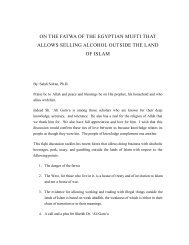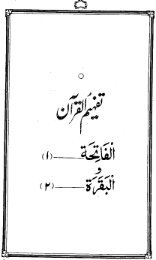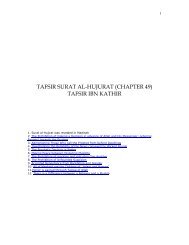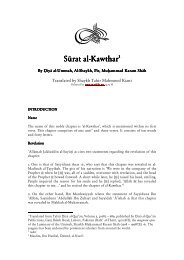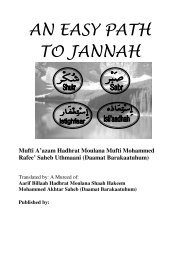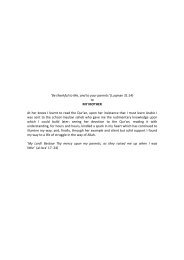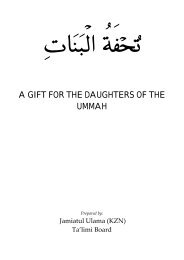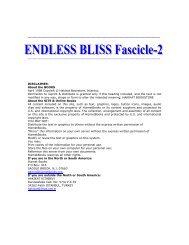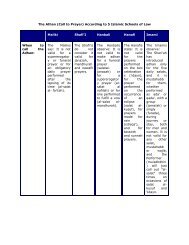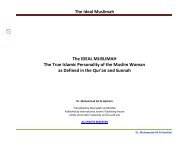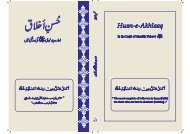Rebellion and Civil Disobedience in Islam The Need for a Paradigm ...
Rebellion and Civil Disobedience in Islam The Need for a Paradigm ...
Rebellion and Civil Disobedience in Islam The Need for a Paradigm ...
You also want an ePaper? Increase the reach of your titles
YUMPU automatically turns print PDFs into web optimized ePapers that Google loves.
Hajjaj <strong>and</strong> many rebels were killed. Al-Hajjaj executed some jurists such as Sa‘id Ibn al-Jubayr who was known <strong>for</strong> his erudition <strong>in</strong> <strong>Islam</strong>ic jurisprudence.5) Zayd Ibn Ali, another member of the Prophet’s family, rebelled aga<strong>in</strong>st theUmmayyad Caliph Hisham Ibn Abd al-Malik <strong>in</strong> Kufa <strong>in</strong> 122H (740) but was defeated,killed, <strong>and</strong> crucified. Abu Hanifah supported Zayd’s rebellion <strong>and</strong> provided Zayd with aconsiderable sum of money 39 . In fact, when the Umayyads ordered Abu Hanifa to assumea judicial position <strong>in</strong> Kufa, he refused to do so because this would have been a valuablesymbolic gesture <strong>in</strong> favor of the legitimacy of the Umayyads. As a result of his refusal,Abu Hanifa was mercilessly tortured but he never recanted his position.6) Yazid Ibn al-Walid Ibn Abd al-Malik led the first rebellion aga<strong>in</strong>st the Umayyads<strong>in</strong> their capital <strong>and</strong> locus of power <strong>in</strong> the Levant <strong>in</strong> 126H (744). <strong>The</strong> rebellion ended <strong>in</strong>kill<strong>in</strong>g the notorious Umayyad Caliph al-Walid Ibn Yazid Ibn Abd al-Malik who<strong>in</strong>flamed the religious feel<strong>in</strong>gs of the masses by his immoral <strong>in</strong>iquitous behavior. Aftergett<strong>in</strong>g the pledge of allegiance of Muslims, Yazid declared that the political systemwould resuscitate the pr<strong>in</strong>ciple of shura (consultation) <strong>and</strong> the right of people tooverthrow the unjust Imam <strong>and</strong> participate actively <strong>in</strong> choos<strong>in</strong>g the next Caliph. He alsodeclared the establishment of justice among people whether they were Muslims or non-Muslims. Yazid is considered the only Umayyad Caliph who has risen to power afterbe<strong>in</strong>g freely chosen by the community 40 . He has not reached his position by heredity orusurpation but rather by bay‘ah <strong>and</strong> shura. He was named al-Naqes (the reducer) becausehe decreased the grants given to the Umayyad family from the public treasury.7) Muhammad a-Nafs al-Zakiyyah Ibn Abd Allah Ibn al-Hasan revolted aga<strong>in</strong>st theAbassid Caliph al-Mansour <strong>in</strong> 144H (761). <strong>The</strong> Muslims <strong>in</strong> al-Hijaz pledged theirallegiance to al-Nafs al-Zakiyyah despite their preced<strong>in</strong>g pledge to al-Mansour. WhenImam Malik was asked about the bay‘ah to al-Nafs al-Zakiyyah, he responded that it waslegal because the bay‘ah given to al-Mansour was obta<strong>in</strong>ed under duress <strong>and</strong> there<strong>for</strong>ewas <strong>in</strong>valid. Al-Mansour defeated al-Nafs al-Zakiyyah <strong>in</strong> al-Mad<strong>in</strong>ah <strong>and</strong> when the newsreached Muhammad’s brother Ibrahim <strong>in</strong> Iraq, he <strong>and</strong> his followers did not panic butrather <strong>in</strong>sisted on fight<strong>in</strong>g <strong>in</strong>justice till victory or martyrdom. Abu Hanifa who hadsupported the Abassids, because of the corruption <strong>and</strong> <strong>in</strong>justice of the Umayyadis, wasoutraged by al-Mansour’s brutality. When one of al-Mansour military comm<strong>and</strong>ers askedhim if he could repent after he had participated <strong>in</strong> kill<strong>in</strong>g rebels, Abu Hanifa replied thathe could, on the condition of absta<strong>in</strong><strong>in</strong>g from kill<strong>in</strong>g any more Muslim <strong>and</strong> sacrific<strong>in</strong>g hislife if ordered to smash Ibrahim’s rebellion. Ibrahim was defeated <strong>and</strong> Abu Hanifa paidthe price of his s<strong>in</strong>cerity <strong>and</strong> belief as he previously did with the Umayyads.39 <strong>The</strong>re is disagreement as to why Abu Hanifa was not able to jo<strong>in</strong> the actual fight<strong>in</strong>g. Accord<strong>in</strong>g to onereport, Abu Hanifa said that if he did not know that the people would betray Zayd <strong>and</strong> allow him to bekilled, he (Abu Hnaifa) would have jo<strong>in</strong>ed Zayd. Accord<strong>in</strong>g to another report, Abu Hanifa was unable tojo<strong>in</strong> Zayd because of illness, <strong>and</strong> <strong>in</strong> yet another version, Abu Hanifa was unable to jo<strong>in</strong> the revolt becausehe was responsible <strong>for</strong> many trusts. Abu Hanifa asked the jurist Ibn Abi Layla to take over theresponsibility of the trusts, but Ibn Abi Layla refused. Unable to f<strong>in</strong>d anyone to take responsibility of thetrusts, Abu Hanifa had no choice but not to jo<strong>in</strong> the battle.40 It can be argued that Mu‘awiyah also reached power after the community agreed on him <strong>in</strong> ‘am‘aljama‘a. Evaluat<strong>in</strong>g what happened <strong>in</strong> that year is outside the scope of this booklet.21



